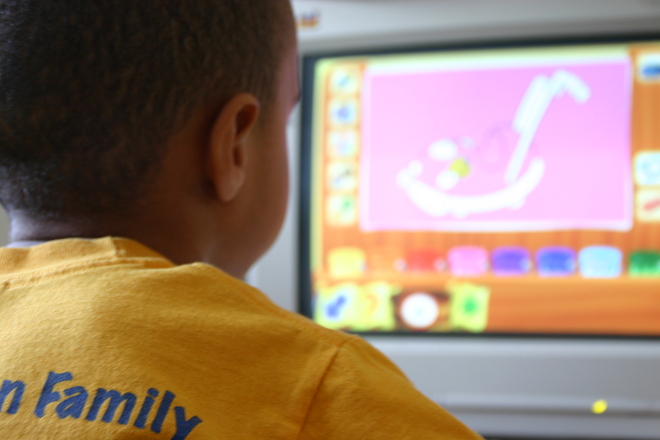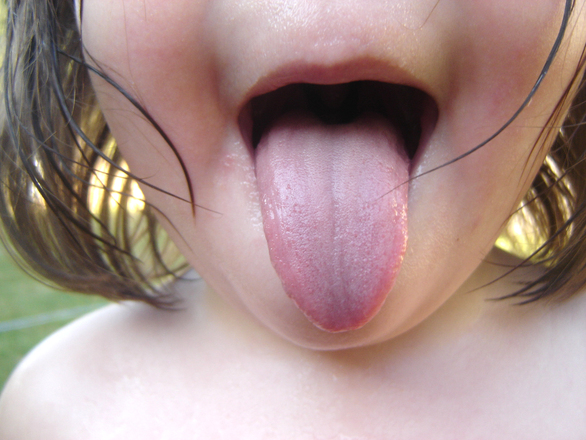Blog
Study: Kids With ADHD Thrive With Positive Reinforcement
Part of what our pediatric therapists at FOCUS Fort Myers work on with all “our kids” is regulation of emotional responses. Let’s face it: We all get angry. It takes time to learn to control our responses, and even adults still struggle with it. It can be especially difficult for children who have been diagnosed with attention deficit hyperactivity disorder (ADHD). We recognize it;s also sometimes challenging for parents to walk the fine line between healthy expression of emotion and losing one’s temper. That’s true for ALL parents at some time or another, but it’s especially true for those with children who have ADHD.
But here is reason to keep trying: A recent study by researchers with The Ohio State University, published in the journal Clinical Psychological Science, found that when parents reduced harsh parenting approaches (i.e., criticism, yelling, physical punishment, etc.), it had a powerful calming effect on children with ADHD. By instead using positive reinforcement, kids were more responsive and cooperative.
The researchers delved into what they identified as the physiological markers of emotional regulation within children of preschool age who had been diagnosed with ADHD. They evaluated these markers after different types of parent and child disciplinary interactions. What they discovered was that when parents used less physical discipline, less yelling, etc., and instead focused problem-solving, their children responded better and the discipline was more effective.
- Categorized: Behavior Therapy, Occupational Therapy
- Tagged: ADHD, behavior therapy, FOCUS families, occupational therapy, pediatric therapists
Speech Therapists Use Social Stories to Spur Language Development
Sometimes children with speech and language delays need a bit of additional help learning about social situations and appropriate responses. Our speech therapists in Fort Myers know one tool that has proven extremely useful is “Social Stories.”
A social story is basically what it sounds like: It’s a short, simple story intended to teach children what to expect in certain social settings. These short books, which include pictures of the child and familiar settings, don’t have to be fancy. They can incorporate photos you shoot on your smartphone and print out on your computer. A therapist can craft or help you create a social story for help with certain scenarios in which your child seems to be struggling. When the story is read repeatedly to the child, combined with images of themselves and the difficult scenario they are confronting, it can be powerful. Social stories can also help those with language delays and deficits to understand certain nuances of interpersonal communication – giving them tools to interact in a manner that is both appropriate and effective.
Social stories were first developed in the early 1990s by Carol Gray, a Michigan school teacher whose four children were diagnosed with autism spectrum disorder. She explained it helps children understand what can be difficult for those with language delays or deficits to comprehend.
- Categorized: Speech Therapy
- Tagged: pediatric speech therapy, social stories, speech therapists, speech therapy, speech therapy Fort Myers
Occupational Therapists Can Assist With Motor Planning for Children With Cerebral Palsy
Motor planning is the ability to plan and carry out motor tasks. As our occupational therapists in Fort Myers know, this can be especially difficult for children with cerebral palsy. Early intervention is critical because motor planning is essential for every day functioning. When one has a deficit in motor planning, it’s going to result in motor behavior that is slower, clumsier and inefficient. It can mean physical activities are tougher to learn, retain and generalize. They may end up appearing awkward when trying to carry out a specific task. Occupational therapy helps children with cerebral palsy by working on these skills day-in, day-out, using fun activities to help them master each element of the activity.
A recent longitudinal study published in the Journal of Clinical Neuropsychology explored this connection between motor planning and cerebral palsy. Researchers closely followed 22 children with cerebral palsy alongside 22 other neuro-typical children of the same age. Each child was asked to perform a task that required those involved sacrificing their initial posture comfort to achieve an end-state comfort. Researchers made repeated observations over the course of a year.
What they discovered was that children with cerebral palsy showed poorer end-state planning when achieving critical angles. Further, unlike those children in the “control group,” those with cerebral palsy did not display improved motor planning skills over the course of a year. Researchers recommended more efforts be made to intervene and enhance motor planning skills for children with cerebral palsy.
At FOCUS Therapy in Fort Myers, we can offer help from both occupational therapists and physical therapists, teaming up together simultaneously or working from the same plan of care, to help a child improve their motor planning skills.
Occupational Therapy Can Help Your Child With Transitions
Staff Report, FOCUS Therapy
Change is a part of life. From a strict dictionary definition, a transition is a passage from one state, subject or place to another. For children with delays or special needs, transitions can be difficult, whether it’s from one activity to another, one functional level to another or one environment to another.
Occupational therapy helps prepare children for changes in their roles and routines. In fact, one of the key goals of our Fort Myers occupational therapists is to help support transition for families and children – with or without disabilities – so that children can grow and learn to be as independent as possible.
A primary objective in occupational therapy is to help children in participate and function in daily routines. When a child can successfully transition from one task to another or one stage in life to another, overall long-term outcomes are better.
Physical Therapy Can Help Children With Fetal Alcohol Syndrome
Staff Report, FOCUS Therapy
Fetal alcohol spectrum disorders (FASDs) are conditions that result in a person whose mother drank alcohol during pregnancy. The effects can include problems with learning and behavior, as well as issues with muscle tone. At FOCUS in Fort Myers, we know that early diagnosis and early intervention can make a huge difference in a child’s long-term prognosis. Physical therapy is one aspect of that plan.
There is no lab tests that definitively proves a child has fetal alcohol syndrome, and many of its symptoms can reflect conditions like attention deficit hyperactivity disorder (ADHD). Federal data from the U.S. Centers for Disease Control and Prevention (CDC) reveals there are as many as 1.5 infants with FASDs out of every 1,000 live births. One recent study found that 1 in 10 pregnant women reported using alcohol use (at least one drink) at some point during her pregnancy and 1 in 33 reported binge drinking (defined as four or more drinks at a time) in the previous 30 days.
Therapies must be tailored to each individual child because fetal alcohol syndrome can affect children differently. As noted by WebMD, symptoms of the condition may include:
- Learning disabilities
- Trouble with coordination, attention and memory
- Hyperactivity
- Struggle with sleep/ nursing (infants)
- Problems with bones, kidney or heart
These symptoms can worsen if not treated. Although FASDs are not curable, they can be treated and their impact lessened. Those who are diagnosed and treated before the age of 6 show the best outcomes.
- Categorized: Physical Therapy
- Tagged: fetal alcohol syndrome, physical therapy
Speech Therapist Answers: “Why Does My Child With Autism Echo Words and Sounds?”
Staff Report, FOCUS Therapy
When a child with autism is first learning how to speak, it’s often delayed and it may not develop in the same way as typically functioning children. As your Fort Myers speech therapist can explain, many begin by copying words they hear, as opposed to trying out new words or phrases they generate on their own. This type of “echoing” is clinically referred to as “echolalia,” and it’s often a vital first step in verbal communication.
Echolalia is the exact repetition or echoing of sounds or words. A child with autism will often use words in the same order – and sometimes even in the same tone – as what they hear, be it from another person or in a book or television show.
Although it may not have any communicative meaning (there is a difference between functional and non-functional echolalia), it can be an excellent place for your speech therapist to begin work with your child on meaningful communication.
- Categorized: Speech Therapy
- Tagged: child speech therapist, echolalia, Fort Myers speech therapist, speech therapist, speech therapy
“Bad” Behavior in Kids Could Signal Need for Occupational & Speech Therapy
Staff Report, FOCUS Therapy
At some point, most parents have been on the receiving end of judgmental looks due to a child’s behavior. Tantrums in the cereal aisle are practically an official rite of passage for all toddlers. But “bad” behavior could be a sign of a deeper issue. Occupational therapists and speech therapists in Fort Myers know that sometimes, “bad” behavior goes hand-in-hand with a clinical condition with symptoms that can be mitigated with prompt and proper treatment.
For instance, a child grappling with a speech delay may find the most effective form of communication is behavior some find socially unacceptable. These behaviors can include tantrums and aggression, but also non-compliance, running away or resistance. Understandably, parents may feel unprepared or unequipped, and respond ineffectually with tactics like yelling, repeated admonition or just giving in. Both parent and child remain trapped in a frustrating cycle.
According to one study published by researchers with Western Michigan University, a significant portion of children with language disorders also have co-occurring emotional or behavior disorders. Despite this, most children diagnosed with an emotional or behavior disorder have not been evaluated for speech-language problems. When a child has receptive and expressive delays or disorders, it can directly impact their social functioning – and in turn, their behavior.
- Categorized: Speech Therapy
- Tagged: occupational therapy, speech therapist, speech therapists, speech therapy
Study: Speech Delay May be Caused, Worsened By Excess Screen Time
Staff Report, FOCUS Therapy
An increase of screen time among young children – particularly involving smartphones and iPads – may heighten the risk of a speech delay, according to new research presented at the 2017 Pediatric Academic Societies Meeting.
As Science Daily reports, the analysis examines whether handheld screen time use is associated with an increase in language delays among infants. Over the course of four years, researchers looked at how closely about 900 children, ages 6 months to 2 years, interacted with electronic devices. Then they compared their rates of language and speech delay.
By the time these children reached 18 months, 20 percent of them were using a handheld device an average of a half hour daily. The children were then screened for a speech delay. Researchers found that for each 30-minute increase in the time these children had access to handheld screens, there was a 49 percent higher risk of expressive speech delay.
Expressive language skills are broadly understood to describe how a person communicates their wants or needs. It encompasses both verbal and non-verbal communication, such as facial expressions, gestures, vocabulary and syntax (grammar rules).
- Categorized: Speech Therapy
- Tagged: smartphones, speech delay, speech delays, speech therapists
What’s the Big Deal About Scars, Anyway? An Occupational Therapist Explains.
By Krystle Hofstetter, MScOTR/L, Occupational Therapist at FOCUS
Almost all of us have one, yet we try our best to pretend they don’t exist. They vary in size, shape, color and even texture. Some are new, while others we’ve had as long as we can remember. Some are painful, even years after they formed.
We’re talking about scars.
What all scars have in common is that each has related scar tissue that compromises the balance and function of surrounding tissue. In some cases, it can even be detrimental to other areas of our bodies. Scar tissue does not remain just at the scar site. Rather, it continues to grow like a vine throughout our bodies over the years, causing or contributing to problems down the road.
Children especially may have trouble with scars because their bodies are still growing. Adults may experience chronic pain, tightness and unease if scars aren’t treated properly.
As a Fort Myers occupational therapist, I recognize that untreated scars may hinder development and wound recovery in several surprising ways. The good news there is a method to help address these issues. It’s called Scar Release Treatment, and it produces little to no pain and could have long-lasting benefits for you and/ or your child.
- Categorized: Occupational Therapy
- Tagged: occupational therapist, occupational therapy
FOCUS Therapy Dedicated to Childhood Apraxia of Speech Awareness
Staff Report, FOCUS Therapy
This week, FOCUS Therapy was among the many organizations promoting awareness of childhood apraxia of speech, a motor speech disorder that typically becomes apparent as a young child is just learning to talk. The condition is often misdiagnosed because it is relatively rare, though our speech therapists in Fort Myers have successfully treated numerous children with this diagnosis.
The 2017 Apraxia Awareness Day was recognized May 14, the fifth year since it was designated by the Childhood Apraxia of Speech Association of North America (CASANA). The motto of the organization is, “Every Child Deserves a Voice.”
We work toward that goal in our own speech therapy program, with the firm belief that it starts with correctly identifying the condition early on, and beginning therapy as soon as possible. Children with apraxia who do not receive early intervention may have great difficulty developing speech that is intelligible – a problem that can lead to struggle in all aspects throughout their lives. This is precisely why Apraxia Awareness Day is so critically important.
- Categorized: Speech Therapy
- Tagged: Focus Therapy, speech therapists, speech therapy










